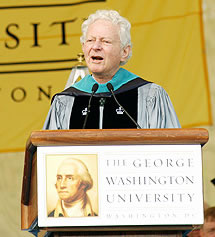 |
|
Published May 16, 2004
He said: 27. And then he said: You know, he said, when I left Washington to go back to my country, I put all these resplendent capes that they give me into a suitcase, which was stolen at the airport. He said: The only regret I had is not taking a photograph of the thief when he opened the suitcase and tried to figure out what it is he had stolen. Well, these capes are admittedly not very useful, but they're symbolic, and it's symbolism which certainly scientists and artists and so on share and respect for this. I thought hard about what to say in a short time to express my appreciation for this honor and this distinguished University. I could give you some advice or I could tell you some jokes. Yes, I know your vote. So let me combine these, first by a story of two university graduates who happened to play varsity baseball. They went on to distinguished careers, both of them, in professional baseball. They grew old together, very friendly. Sooner or later, one of them was very close to passing and his friend said to him: Look, when you get to heaven please send me a message; tell me whether we can still continue baseball in heaven, because that was his version. Sure enough, a year or so later he hears this voice from the sky saying: Harry, he said, I'm in heaven. Oh my God, he said, that's wonderful. Tell me, baseball? Oh, baseball is terrific. Everybody's here. Joe DiMaggio is here, Babe Ruth is here, Lou Gehrig is here. We're having great baseball games. That's the good news. Oh, the bad news is I see you're going to pitch next week. And I'm going to give you now good news and bad news. The good news is all around you: You're graduating. Wow, you know, you're finished, wow. Some of you, I know it's hard to believe, may even have jobs. That's the good news. The bad news is, once upon a time Americans would spend the first 20 or so years of their lives learning, studying, and then the rest of their lives, the next 40 or so years, or 50 or 60 if you're lucky like me -- I hope one of you there does research in senility avoidance; I'm in a hurry. But the point of the bad news is that using the education you had for the rest of your life doesn't work any more. There's a nice-sounding phrase called "lifelong learning." That's no longer a slogan; it's a necessity. Whether you're getting a bachelor's a degree, a master's degree, or a Ph.D, it is absolutely essential that you keep learning. People have estimated that an average electrical engineering sequence is obsolete after about three or four years. The world is changing with incredible rapidity. Oh, well. And you have to keep learning. That's an essential feature, I think, of our future. Let me also, while I'm at this, try to enlist you in a different kind of a war, a war on ignorance, a war on superstition. Think about becoming a teacher. To me the profession that will most help this country recover to a state of both economic, cultural elegance is teaching. We've got to make better teachers. Finally, in the point of view of advice and humor, there is the mouse who was very hungry and hiding in a hole. The mouse knows exactly where the cheese is on the kitchen table, but there's an animal walking up and down outside the hole. The mouse is terrified, until the animal makes a noise: Bow-wow. The mouse says: Aha, that's the dog; I can run faster than the dog. So the mouse runs out of the hole. The cat jumps on the mouse, eats him up, and then says: It's very important to know two languages. Thank you.
©2004 The George Washington University Office of
University Relations, Washington, D.C. |
|||


